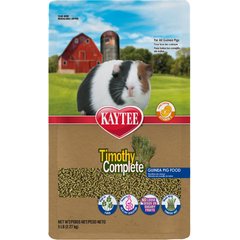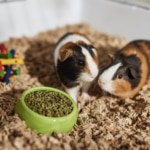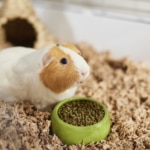Can Guinea Pigs Eat Tomatoes?

Photo by JaysonPhotography / iStock / Getty Images Plus
As you’re chopping veggies for a salad, you may be wondering, “Can guinea pigs eat tomatoes?”
The answer is yes—but only in moderation.
Tomatoes can be a tasty treat for guinea pigs, but due to their acidity and sugar content, they should only be given in small amounts to avoid digestive issues and other potential health problems.
This includes all varieties, like cherry tomatoes and full-size tomatoes, but you want to be mindful of how you’re serving it to them.
For starters, guinea pigs should only eat the ripe tomato flesh and seeds. Remove any stems and leaves from the tomato before serving it to your guinea pig.
You also want to make sure you’re only feeding them ripe tomatoes.
Unripe, green tomatoes contain a compound called solanine, which is toxic to guinea pigs, according to Alisa Rassin, VMD, founder and medical director of Exotic and Small Animal Hospital of Pennsylvania.
Solanine can cause:
- Digestive upset
- Abdominal pain
- Lethargy
Lastly, make sure you’re chopping the tomato into smaller pieces that are appropriately sized for your guinea pig.
This makes it easier for them to eat and gives you more control over the portions you’re giving to them.
How Much Tomato Can You Give Your Guinea Pig?
They should be considered a treat—not something that makes up a foundational part of your guinea pig’s diet.
Rae Porter-Blackwell, DVM, ABVP, board-certified exotic companion mammal specialist at the Center for Bird and Exotic Animal Medicine and vice president of the Association of Exotic Mammal Veterinarians (AEMV), recommends the following dietary breakdown:
- 80% should come from grass-based hay, such as timothy or orchard grass
- 15% can be leafy vegetables
- About 5% can be fruits (like tomatoes) and high-quality pellets
Adult guinea pigs can have one to two cherry tomatoes per week.
You can give them other types of ripe tomatoes too, but make sure the amount you’re giving them is equivalent to the volume of one to two cherry tomatoes.
Recommended Products
If you’re giving your guinea pig other fruits as well, you’d want to decrease that amount so that total fruit intake doesn’t exceed 5% of their diet.
Keep in mind that this only applies to healthy, adult guinea pigs. Younger guinea pigs don’t have a fully mature gastrointestinal (GI) tract, so you should feed them less tomato than you would an adult guinea pig.
If your guinea pig is experiencing issues with obesity, it’s a good idea to limit (or completely avoid) extra food items like tomatoes until they’re a healthy weight.
Additionally, if your guinea pig has any GI symptoms, like changes in the frequency and/or size of stool or diarrhea, don’t feed them anything that’s considered a fruit, according to Dr. Porter-Blackwell.
Benefits of Giving Tomatoes To Your Guinea Pig
There are no real known health benefits to giving your guinea pig tomatoes, according to Dr. Porter-Blackwell. While they do have micronutrients that are good for human health, there’s still a lot to learn about the effects on guinea pig health and several lingering questions on whether health benefits transfer to most exotic companion mammals.
At the very least, Dr. Rassin says tomatoes do have some vitamin C, which is an essential nutrient for guinea pigs. Plus, they’re a low-calorie veggie/treat so they won’t add a bunch of unnecessary calories to your guinea pig’s diet.
Most of the benefit is going to be the joy it brings your guinea pig, though. If they love to munch on tomatoes, eating them as an occasional treat can make your furry friend happy.
Risks of Giving Tomatoes To Your Guinea Pig
While tomatoes do have some health benefits for guinea pigs, they’re not without risk. Tomatoes are high in oxalic acid, which can contribute to cheilitis, an inflammatory condition that causes sores or scabs around a guinea pig’s mouth, according to Dr. Rassin.
Too many tomatoes can also cause digestive upset. “When feeding a guinea pig, we feed the microbes in a special part of their GI tract called the cecum. They acquire the energy they need by fermenting their food in the cecum. When we increase the carbohydrate or sugar content of the diet by overfeeding things like fruit, we change how that fermentation works and that can lead to stomach upset or illness,” says Dr. Porter-Blackwell.
Additionally, tomatoes are also relatively high in sugar compared to a guinea pig’s normal diet. They’re not a high-sugar fruit per se, but they provide a considerable amount of sugar compared to the grass-based hay that should make up the bulk of your guinea pig’s diet.
If you notice any changes in your guinea pig’s bathroom habits or physical health, stop feeding them tomatoes and immediately talk to your vet about whether you should get additional care for your furry companion.







